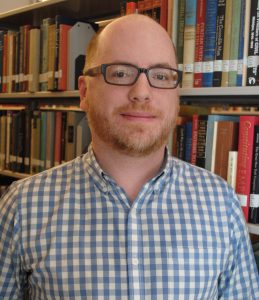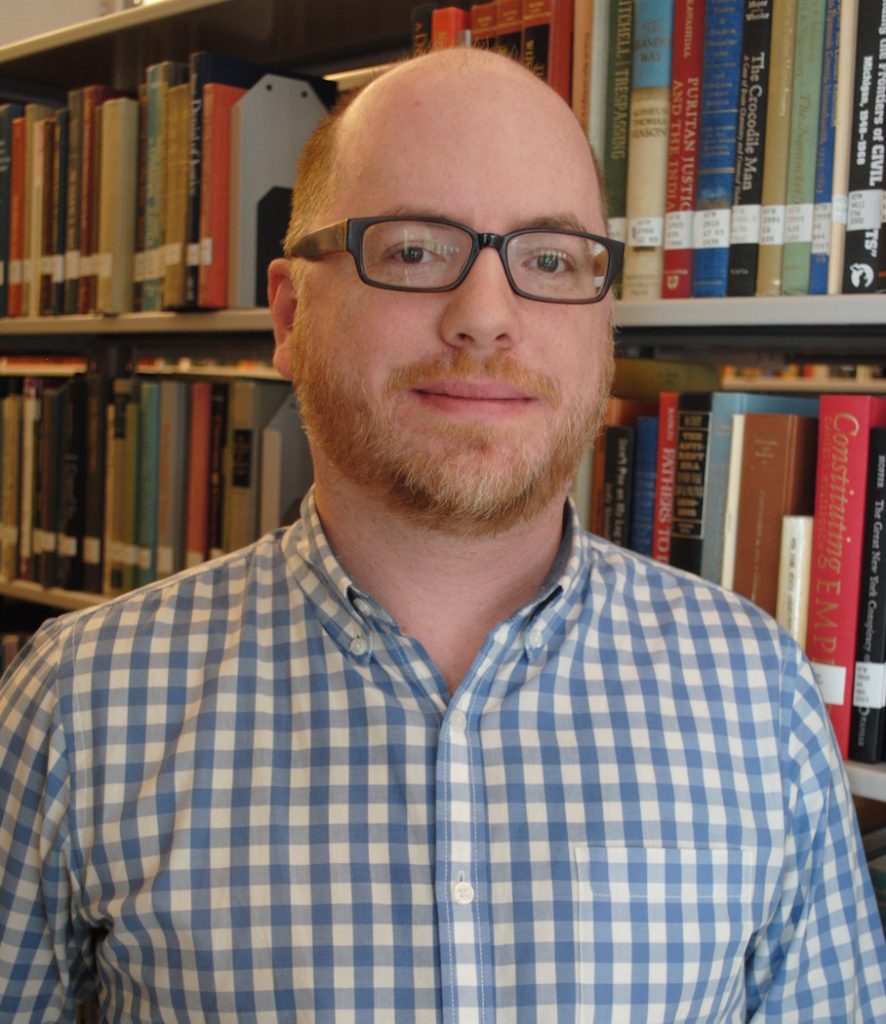 In each issue of Keywords, we profile a staff member who works in the library or a related department. This issue features Data Services Librarian Ryan Clement.
In each issue of Keywords, we profile a staff member who works in the library or a related department. This issue features Data Services Librarian Ryan Clement.
Hi Ryan! Tell the Keywords readers a little bit about yourself. Where do you come from? How did you get here? How long have you been at Middlebury?
Hi Keywords readers! I’m originally from Michigan, but I’ve lived on all three coasts (Michigan has more miles of coastline than any other of the lower 48 states). Just before coming to Middlebury in the fall of 2015, I was the Data Services Librarian at Reed College in Portland, OR. I loved what I was doing at Reed, but my wife and I wanted to be closer to her family with our new daughter (Eloise, born in July 2015). When I saw a job posted at Middlebury that was doing the same work I was doing at Reed, but in Vermont, I had to jump on it!
At a recent library staff meeting, Dean of the Library Mike Roy referred to you as “the numbers guy.” Do you embrace this moniker? How does this role contribute to your work here in the library?
Though data often gets translated to “numbers” or “statistics,” I try and emphasize that my position includes data of all types – both quantitative and qualitative. I don’t have a formal background in statistics, but I’ve worked on teaching myself enough to work with students in some of the more quant-heavy fields I work with (such as economics). However, I love working with data no matter what form it takes. I often help students from geography and other disciplines in working with spatial data, and have recently been helping Sarah Laursen, from HARC and the Museum, to gather more descriptive data on museum collections. When it comes down to it, data is any material that you want to use systematically for research or analysis.
How’d you develop your skills with Zotero and come to be known as the resident expert on this citation management tool?
I’ve used Zotero since 2010, when I started my Master of Science in Information degree at University of Michigan’s School of Information. It was essential in helping me to maintain my sanity and organization while pursuing a graduate degree and working multiple jobs. Since then, I’ve continued using it to build my professional research library, and share important resources with colleagues. The other “resident expert” on Zotero, Wendy Shook, has been using Zotero even longer than I have – since the very first version! I think our passion for helping students and faculty learn about this tool comes from seeing how useful it was during our own graduate research, and also from seeing all the creative ways students and faculty have used the tool since we’ve taught them about it.
I heard you had a special relationship with Trader Joe’s. Can you tell us more about that and how it prepared you for the work you do now?
I worked for Trader Joe’s for 10 years – I got a job with them in Ann Arbor, MI, after completing my undergraduate degree. I was able to keep working with them through two graduate degrees, five cities, and countless life changes. For a few years in the middle, I helped to manage the first Trader Joe’s in New York City, on 14th St near Union Square. It was the busiest, most chaotic, and most interesting Trader Joe’s in the country at the time, and still certainly ranks among the top. From my time at Trader Joe’s, I learned many things, but among the most important were the importance of providing folks with truly friendly service in the midst of their busy days, the fact that you usually don’t know what someone really needs until you talk to them about it, and a taste for mandarin orange chicken.
You’ve lived in the west, midwest, and northeast – what is your favorite part about living in Vermont? How do you like to spend your time outside the library? There are whispers and murmurs of a red-headed child in your family. Who is she and what is she like?
I love how close things are here in Vermont – the mountains, the lake, even Montréal is a relatively quick trip. Outside of working in the library, I love spending time in nature, particularly in the mountains, and sampling the amazing craft beers from all over Vermont (I’ve been lucky to live in some of the best craft beer states, including Michigan and Oregon). I love to bake, particularly breads and pizza-making. I also love making music – I started out playing drums when I was younger, but have spent more time as an adult making sample-based electronic music. Of course, I haven’t had a lot of time for that recently, because yes, I do have a wonderful little red-headed 2.5 year old named Eloise. She is full of energy, like most 2 year olds, and loves dinosaurs, spooky things, and Daniel Tiger. She is also a lover of music and dancing, and recently has acquired her very own snare drum – so maybe making music will be something we can do together!
Including the resources you use daily for your job, what is your favorite library resource that you wish more people knew about?
My favorite library resource is the Inter-university Consortium for Political and Social Research (ICPSR). We’re members of this consortium at Middlebury, so we both support their mission as well as get full access to all of their wonderful features. They maintain and provide access to a huge archive of social science data for research and instruction (over 65,000 datasets!), as well as providing data management and curation assistance, training in quantitative methods and tools, and more! I’m truly proud that Middlebury can be a part of supporting ICPSR’s goals and mission, and wish everyone would take a look at all they have to offer for supporting both research and teaching.
What library and data skills do you hope students leave Middlebury with?
I hope students leave Middlebury with the skills to use information and data ethically, to communicate their findings honestly and creatively, and to assess other presentations of data and information critically and analytically.
